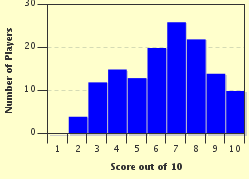Quiz Answer Key and Fun Facts
1. From which area of the world did most domestic chickens originate?
2. Which term was given to chickens in Egypt of the 15th century?
3. By what name are chickens in the deep south of the US called?
4. How does a rooster initiate courting of a hen?
5. If two hens compete over a small nest, what unusual result can occur?
6. How do broody hens maintain regular egg temperature?
7. What do hens do to encourage their chickens to break through their shells?
8. Approximately how long is the incubation period prior to a chicken hatching?
9. What do newborn chickens feed on immediately after hatching?
10. What is a chicken reared for meat called?
Source: Author
Creedy
This quiz was reviewed by FunTrivia editor
guitargoddess before going online.
Any errors found in FunTrivia content are routinely corrected through our feedback system.


